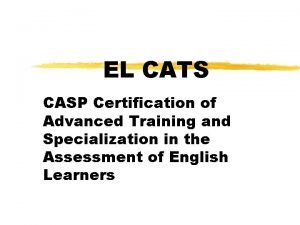EL CATS CASP Certification of Advanced Training and










- Slides: 10

EL CATS CASP Certification of Advanced Training and Specialization in the Assessment of English Learners

Proposed Requirements: 1. School Psychology Credential 2. Two years practice 3. Documentation of 15 hours of training (minimum of 3 hours in each area): • • Second Language Acquisition Educating English Language Learners Culturally and Linguistically Diverse Perspectives Bilingual Assessment 4. Attendance at 16 -hour CASP workshop 5. Comprehensive case study to be scored by two reviewers

Historical Context in the Assessment of English Learners z. History of psycho-educational testing with English Learners z. Federal laws protecting English Learners z. Key California court cases z. History of bilingual education z. Five main types of instructional programs used to teach English Learners z. Impact of Proposition 227

Impact of Cultural, Linguistic, and Educational Factors on Learning z Importance of “opportunity to learn” z Critical information needed for EL student y. Educational history of student y. Effectiveness of prior instruction y. Linguistic factors y. Degree of acculturation of family and student y. Socioeconomic status of family z Parent interview z Practical tools

Training and Working with Interpreters z. Bilingual/bicultural specialists z. Basic definitions z. Role of interpreter z. Three-tier model of interpretive process z. Guidelines for training interpreters z. Limitations of interpretive process

Tier II Data Collection and Intervention Planning z. Ecological data collection z. Use of BICS/CALP conceptual framework z. Progress monitoring of EL students and assessing Response to Intervention y. Use of naturally occurring data y. CBM methods y. Creating new methods to monitor progress z. Case study

Tier III Assessment z. Need for “outside the box” thinking z. Review of important concepts regarding test construction and test use with ELs z. Non-test based assessment z. Test-based assessment z. Advantages/disadvantages of newer tests purported to be fairer for English Learners z. Case studies to illustrate key points

IEP Development for English Learners z. Initial steps z. Writing appropriate goals and objectives z. Legal requirements z. Placement issues z. Instructional implications

Report Writing z. Necessary components for legal compliance z. Traditional style z. Thematic style

Final Case Study Review z. Required components of case study z. Model case study, including sample report z. Scoring criteria
 Malteruds tjekliste
Malteruds tjekliste Vurdering af kvalitative studier
Vurdering af kvalitative studier El casp
El casp Casp difficulty
Casp difficulty Alteryx case sensitive
Alteryx case sensitive Figurative speech personification
Figurative speech personification As i was saying by augustus gluten genre
As i was saying by augustus gluten genre Cats of borneo chronological order
Cats of borneo chronological order Cats rats and bugs in borneo story
Cats rats and bugs in borneo story Intradermal injection indication
Intradermal injection indication It's raining cats and dogs hyperbole
It's raining cats and dogs hyperbole



















